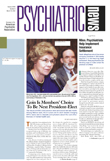When I graduated from my residency one and a half years ago, I stayed on as faculty at the institution where I did my residency training. As I look back on the time since graduation, I am aware that there are many advantages and disadvantages involved in that decision.
As I was completing my fourth year of residency and contemplating what to do next, I was interviewing at other institutions as well as looking into my own institution for faculty positions. I eventually made the decision to stay where I was and took a position as medical director of a 16-bed inpatient unit at the state institution connected to our medical school.
With this position came the responsibility for 16 acutely ill inpatients, the education of two second-year residents at any given time, one fourth-year chief resident, two psychology interns, and four medical students a month. I was also responsible for managing an inpatient staff.
I was intimidated and overwhelmed but very excited. I was aware that the level of responsibility far exceeded my experience. This was when I first became aware of the implications of staying on at the institution where I had once been a trainee.
There are some obvious advantages to staying on at one’s “home” institution. One does not have to relocate to a new city, make new friends, buy a new house, and face whatever inconveniences moving causes.
However, there are other considerations that are more complicated. For example, in my case, the faculty who hired me and were willing to support such a novice in this medical director position knew me well. In fact, they had participated in my training and were aware of most of my strengths and weaknesses.
I also knew them well. Our department, as with all departments, has its politics. I was aware of some of the politics among the faculty that would affect me significantly. I now appreciate my understanding of these dynamics more than I had upon graduation. Knowing who to go to and for what, who not to go to, who knows whom, who likes whom, who doesn’t like whom, who supervises whom, and so on are important pieces of information for the survival of junior faculty. Being aware of many of these dynamics among our faculty gave me a very definite advantage.
Staying on as faculty at one’s training institution also has its costs, however. For instance, being given so much responsibility without the cumulative experience to feel secure with it was a mixed blessing. Though I had an enormous amount of support to do my job, the responsibility at times felt overwhelming. I would not have been able to handle this position at a different institution, so by staying on at my institution, I was able to take on a position with much more responsibility and prestige. Moreover, had I taken a position at a different institution as a recent graduate, I would likely have been given a “trial period” with less responsibility until I gained some experience and a better understanding of the system.
There have also been times when I felt as if some faculty members are not aware that there has been any change in my status; that is, they treat me as though I am still a resident. It happens infrequently, but it happens. I imagine that this happens because I did my training here, and some people have not yet realized that their relationship with me has changed. This can be somewhat frustrating as I have tried to establish my independence while adjusting to the demands and requirements of the department.
It is easy to feel that at times I am not taken seriously. This probably can occur regardless of whether one remains in one’s training institution, but I suspect it is more likely when the dynamics have already been established.
Similarly, there have been times when I have been placed in the position of managing conflicts with faculty members who were once my supervisors. Managing conflicts with faculty members can be an awkward experience for anyone, but having once been in the position of trainee makes it all the more difficult. I imagine, though, that resolving conflicts as a newcomer to a system would be equally challenging.
In summary, there are many complex factors that need to be considered when making a decision regarding staying on as faculty or leaving one’s institution after graduation. I do not regret staying on at my institution in any way, but I am becoming more aware of the mixed blessings of this decision as I gain perspective on my choices and their effects on my career. ▪

